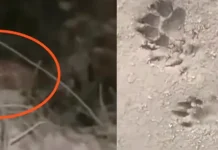Staff Reporter
ITANAGAR, May 17: The unidentified body of a young woman, aged around 18-19 years, who had been shot and burnt, was found in Hawa Camp (Kimin) area in Papum Pare district on Thursday noon, the police informed.
The body was reportedly spotted by a local resident, 200 metres from the main road towards Sele village.
Papum Pare SP Pranav Tayal informed The Arunachal Times that the body was found with a .22 bullet injury in the head, and that 90 percent of her body had been burnt after it had been doused with kerosene.
The SP said a local resident informed the police about the body having been found, and that the deceased was wearing salwar kameez and sandals.
A police team rushed to the spot, and took the body to the Kimin CHC for postmortem, following which the body was sent to RK Mission Hospital’s (RKMH) mortuary for identification.
Tayal said prima facie evidence suggested a planned murder, and that a case under Section 302 IPC has been registered at the Kimin police station.
“The office-in-charge of the Kimin police station himself is investigating the case, and he has been directed to keep in touch with all the officers in charge of Assam’s
boundary police stations for any missing person complaints,” the SP said.
The body is currently in the RKMH morgue, and the police have appealed to the people to help in identifying it.
“So far, no claimant has turned up to claim the body,” Tayal said.
Kimin SDO Likha Tejji has also asked the people to come forward with information.
Meanwhile, the Arunachal Pradesh Women’s Welfare Society (APWWS) has sought inquiry by a special investigation team (SIT) into the case.
Condemning the heinous crime, it urged the Arunachal Pradesh State Commission for Women (APSCW) to direct the authority concerned to constitute an SIT to unearth the details of the incident.
In a representation to the APSCW chairperson, the APWWS demanded that the authority concerned act at the earliest to arrest the culprit(s) behind the gruesome murder.
“Such brutality meted out to the girl is highly condemnable and a very much disturbing trend,” the APWWS said.


